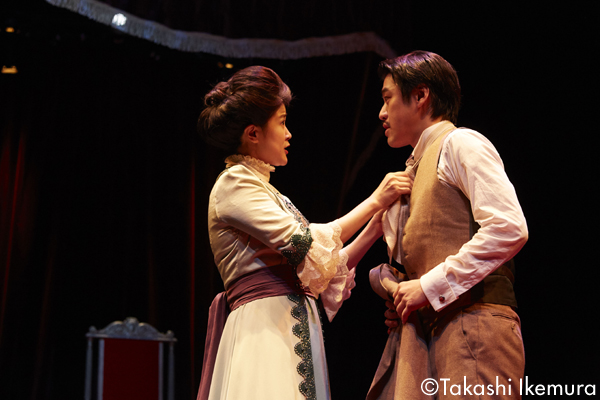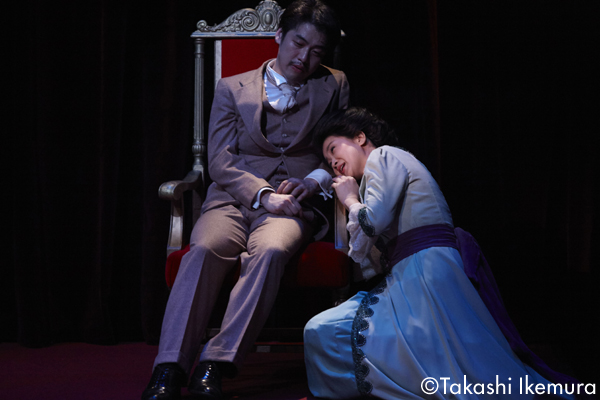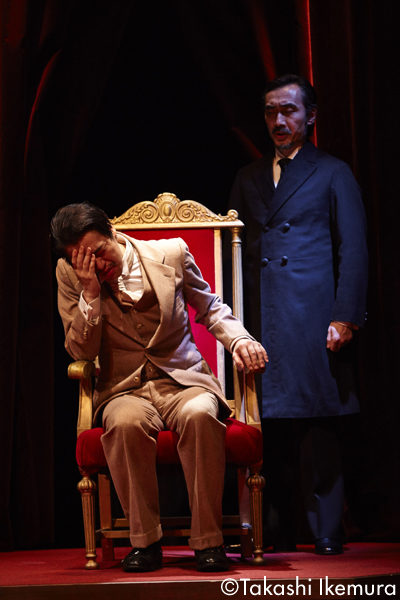


Chocolate Cake
Chiten no Kimi
(restage)
(Sep. 2016) Photo: Takashi Ikemura
Data
:
Premiere: 2013
Chiten no Kimi (Successor to the Emperor’s Throne)

Born in Tokyo in 1978. Since the play Hero premiered as the second production performed by the theater company Chocolate Cake in 2002, Furukawa has been involved in all of the company’s productions. While he appeared initially as an actor, from the company’s 16th production a day in 2009, he has served as scriptwriter. Since then he has written all of the company’s plays. His weighty works taking historical events and social phenomena as their subjects have won high acclaim, resulting in his also writing an increasing number of works for outside productions in recent years. His 2011 work 1911 was a winner of the Outstanding Drama prize of the Satoh Sakichi Awards. In 2014, his play Ano Kioku no Kiroku (Record of that memory) won the Grand Prix of the THEATRO New Playwright Award and Grand Prix of the sun-mall studio Selection Awards, and in the same year Chiten no Kimi won the Special Jurors Prize of the 21st Yomiuri Drama Awards Grand Prix. In 2016, his play Tsuioku no Ariran won the Outstanding Drama award of the Yomiuri Drama Awards Grand Prix and was nominated for the Tsuruya Namboku Drama Award. Also that year his play Line (Kokkyo) no Mukou (Across the Line (Border)) was nominated as a finalist for the Kishida Drama Awards.
Chocolate Cake
http://www.geki-choco.com/



Chocolate Cake
Chiten no Kimi
(restage)
(Sep. 2016) Photo: Takashi Ikemura
Data
:
Premiere: 2013
Nearing death, the Taisho Emperor, Yoshihito was attended by his wife, the Empress Teimei, Sadako, and on unstable legs the Emperor makes his way to sit on his throne. While receiving a visit from his son, Hirohito (later the Showa Emperor), wishing for his recovery from his illness, he apologizes to the spirit of the late Meiji Emperor, Mutsuhito (his father) for being unable to live up to his expectations. While Hirohito stands by in confusion, the Taisho Emperor expresses his gratitude to his wife and then draws his last breath.
The scene shifts to 27 years earlier on the day when Yoshihito and his bride to be, Sadako were first introduced to each other. As the two pledged to be a loving couple, Yoshihito’s father, the Meiji Emperor, looks on with distaste. In the eyes of the Emperor personal feelings are an unnecessary indulgence and meaningless in the presence of a ruler, but when he scolds his son for his display of emotion Yoshihito objects.
To Prince Arisugawa Takehito, who has been in charge of his education, Yoshihito expresses fears that a gloomy future lies ahead. In reply, Prince Takehito suggests that Yoshihito embark on a tour of the temples of the Kinki region in the west to broaden his knowledge.
Meanwhile, Prince Takehito also meets with Yoshihito’s father, the Emperor, who has doubts that his son has the qualities necessary to serve as Emperor in the future, and offers the suggestion that in the coming era it will be possible and perhaps suitable for Yoshihito to adopt a new style of imperial family presence that is more open to the public as in the Western model. But the Emperor has no intention of changing the present imperial role or style, and saying that the position of the imperial successors should forever be one of awe and utmost respect among the people, the Emperor refuses to listen to Prince Takehito’s advice.
Due to a weak constitution since birth, Yoshihito’s longtime friend and supporter Prince Takehito would be taken from him by illness. Around the same time Yoshihito’s father, the Meiji Emperor also passed away.
The scene shifts to after the Taisho Emperor, Yoshihito’s death. To Hirohito, now in his period of mourning, his close advisor Prime Minister Nobuaki Makino proposes that in order to present a strong image of Hirohito as the new Showa Emperor, he should hold a grand celebration of the 60th anniversary of the Meiji Restoration. Seeing Hirohito perplexed by his proposal, Makino admonishes him, saying that the Taisho movement toward freedom and liberalization of the imperial role is no longer appropriate, and that the time has come to restore the glory of the Meiji throne and for Hirohito as Emperor to assume a dominant role in state affairs.
The scene shifts back in time to the Meiji Emperor, Mutsuhito on his deathbed. To his son and Crown Prince Yoshihito, Mutsuhito announces that Hirohito (not Yoshihito) is the one he wants to succeed him to the Chrysanthemum Throne. In this way there remained to the end no resolution of the incompatibility between the father and his son Yoshihito.
Now Emperor, Yoshihito summoned two of his close advisors from his Crown Prince years, Takashi Hara and Shigenobu Okuma, and he gives them his guidelines for the new era ahead. That was to slow the pace of the previous [Meiji] era’s headlong rush to catch up with and surpass the world’s stronger powers and aim instead to become a country that puts enriching the lives and livelihoods of the people first. Though they are have reservations about Yoshihito’s desire to become an Emperor who is closer to the people, Hara and Makino pledge to strive to make progress toward the type of new era he envisions.
Soon the World War I breaks out. Having been victorious in the First Sino-Japanese War and the Russo-Japanese War, Japan decides to enter WWI with the aim of further expanding its power. The Prime Minister at the time, Shigenobu Okuma, succeeds in persuading Yoshihito not to persist with his opposition to entering the war, but Hara candidly exhorts Okuma not to try to make use of the innocent Yoshihito for political purposes.
A discussion between Hirohito and Makino after Yoshihito’s death. Makino says that while at first he followed Yoshihito’s policy of a more open and genial policies, after seeing a number of the world’s emperors dethroned in the course of WWI, he has decided to changed his policy in favor of the Meiji Emperor’s style of an absolute emperor who stands above the people as an object of veneration.
Japan is spurred onward by the prosperity of its wartime economy. Meanwhile, chronic illness is taking its toll on Yoshihito’s body. When Okuma pays a visit to announce his retirement, Yoshihito asks him, “What is it to be an emperor?” Okuma replies, “The emperor is a shrine that you build yourself.” Okuma’s answer is that because of the [Meiji] Restoration that ended the rule of the Tokugawa Shogunate, the people need a leader to worship. He also predicts that if that objective is not properly understood, Japan will fall into a perilous state of affairs.
Okuma tells Yoshihito that he hopes he will live a long life as Emperor and maintain the peace of the nation, but Yoshihito’s worsening [cerebral] meningitis has begun to affect his ability to walk and perform daily tasks, and it is also affecting his speech, making it impossible for him to recite imperial rescripts.
In order to maintain the nation’s respect for the Chrysanthemum Throne, it will no longer be possible to allow the people to see this weakened state of the [Taisho] Emperor, who by definition is supposed to be a living god, so Makino plans to have Hirohito ascend the throne. When Hirohito returns from his royal tour of Europe, Makino and Hara take this opportunity to convince Yoshihito to abdicate the throne with Hirohito as his successor. Although his illness has already made his consciousness and memory vague, these words seem to spark and moment of clarity in which Yoshihito proclaims that he has no intention of relinquishing his duties as Emperor.
As conditions make the succession of the throne to Hirohito imminent, Hara (Prime Minister), who was carefully proceeding with the succession, is suddenly assassinated, causing a rapid progression of events. On November 25th, 1922, Hirohito ascended to the Chrysanthemum Throne. Released at last from the heavy burden of responsibility that was his birthright, Yoshihito, in his private consciousness, gives voice to his feelings of gratitude to his mentor, Prince Takehito, and the previous [Meiji] Emperor, Mutsuhito.
In order to revive the spirit of the Meiji era, Hirohito and Makino are planning to make the Meiji Emperor’s birthday a date to be celebrated as a national holiday and removed the Taisho Emperor’s birthday from its status as a national holiday and returned it to a common weekday in their efforts to erase the Taisho Emperor from the public memory. As he is planning the celebrations for the 60th anniversary of the Meiji Restoration, Hirohito’s mother, the Empress Dowager Teimei, Sadako comes to admonish her son, saying this is and disgraceful act that will bury his father a second time.
To his mother, Hirohito objects that all of this has been part of agonizing decisions he has had to make in the face of dangerous conditions the country faces, and that an Emperor must strip himself of all such sentimentality. Sadako replies that if that is what he believes he should act accordingly, and before leaving she adds that she doesn’t want to see him ever try to flee from his responsibilities.
Yoshihito and Sadako look back over the times of joy they knew a couple that had sworn to love each other for the rest of their lives. Hirohito takes his seat on the Chrysanthemum Throne. To the sounds of the national anthem
Kimigayo
and crowds shouting “Long live the Emperor,” the stage goes dark and the curtain falls.
Related Tags